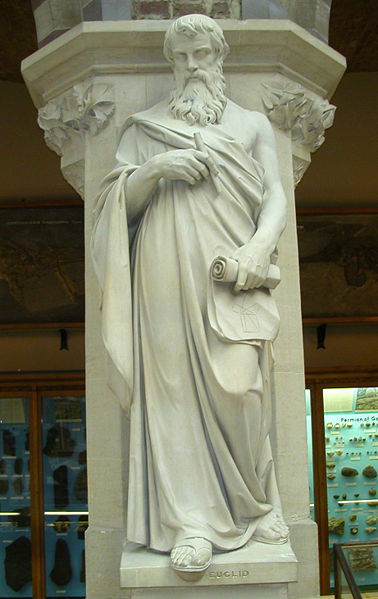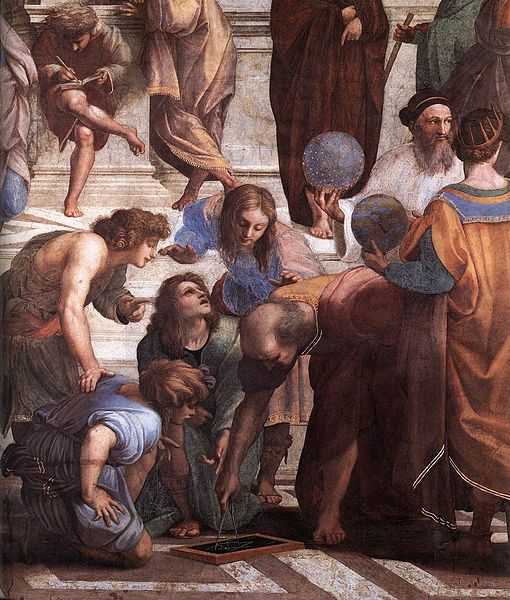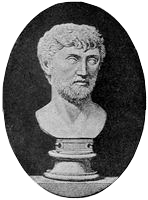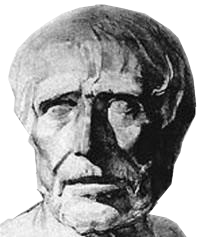<Back to Index>
- Mathematician Euclid of Alexandria (Ευκλείδης ο Αλεξανδρεύς), 300 B.C.
- Poet and Philosopher Titus Lucretius Carus, 99 B.C.
PAGE SPONSOR


Euclid (Ancient Greek: Εὐκλείδης), fl. 300 BC, also known as Euclid of Alexandria, was a Greek mathematician, often referred to as the "Father of Geometry". He was active in Alexandria during the reign of Ptolemy I (323 – 283 BC). His Elements is one of the most influential works in the history of mathematics, serving as the main textbook for teaching mathematics (especially geometry) from the time of its publication until the late 19th or early 20th century. In the Elements, Euclid deduced the principles of what is now called Euclidean geometry from a small set of axioms. Euclid also wrote works on perspective, conic sections, spherical geometry, number theory and rigor.
"Euclid" is the anglicized version of the Greek name Εὐκλείδης, meaning "Good Glory".
Little is known about Euclid's life, as there are only a handful of references to him. The date and place of Euclid's birth and the date and circumstances of his death are unknown, and only roughly estimated in proximity to contemporary figures mentioned in references. No likeness or description of Euclid's physical appearance made during his lifetime survived antiquity. Therefore, Euclid's depiction in works of art is the product of the artist's imagination.
The few historical references to Euclid were written
centuries after he lived, by Proclus and Pappus of
Alexandria. Proclus introduces Euclid only briefly in his
fifth century Commentary on the Elements, as the
author of Elements, that he was mentioned by
Archimedes, and that when King Ptolemy asked if there was
a shorter path to learning geometry than Euclid's Elements,
"Euclid replied there is no royal road to geometry."
Although the purported citation of Euclid by Archimedes
has been judged to be an interpolation by later editors of
his works, it is still believed that Euclid wrote his
works before those of Archimedes. In addition, the "royal
road" anecdote is questionable since it is similar to a
story told about Menaechmus and Alexander the Great. In
the only other key reference to Euclid, Pappus briefly
mentioned in the fourth century that Apollonius "spent a
very long time with the pupils of Euclid at Alexandria,
and it was thus that he acquired such a scientific habit
of thought."
It is further believed that Euclid may have studied at
Plato's Academy in Athens.
Although many of the results in Elements originated with earlier mathematicians, one of Euclid's accomplishments was to present them in a single, logically coherent framework, making it easy to use and easy to reference, including a system of rigorous mathematical proofs that remains the basis of mathematics 23 centuries later.
There is no mention of Euclid in the earliest remaining copies of the Elements, and most of the copies say they are "from the edition of Theon" or the "lectures of Theon", while the text considered to be primary, held by the Vatican, mentions no author. The only reference that historians rely on of Euclid having written the Elements was from Proclus, who briefly in his Commentary on the Elements ascribes Euclid as its author.
Although best known for its geometric results, the Elements also includes number theory. It considers the connection between perfect numbers and Mersenne primes, the infinitude of prime numbers, Euclid's lemma on factorization (which leads to the fundamental theorem of arithmetic on uniqueness of prime factorizations), and the Euclidean algorithm for finding the greatest common divisor of two numbers.
The geometrical system described in the Elements
was long known simply as geometry, and was
considered to be the only geometry possible. Today,
however, that system is often referred to as Euclidean
geometry to distinguish it from other so-called non
- Euclidean geometries that mathematicians
discovered in the 19th century.
In addition to the Elements, at least five works of Euclid have survived to the present day. They follow the same logical structure as Elements, with definitions and proved propositions.
- Data deals with the nature and implications of "given" information in geometrical problems; the subject matter is closely related to the first four books of the Elements.
- On Divisions of Figures, which survives only partially in Arabic translation, concerns the division of geometrical figures into two or more equal parts or into parts in given ratios. It is similar to a third century AD work by Heron of Alexandria.
- Catoptrics, which concerns the mathematical theory of mirrors, particularly the images formed in plane and spherical concave mirrors. The attribution is held to be anachronistic however by J J O'Connor and E F Robertson who name Theon of Alexandria as a more likely author.
- Phaenomena, a treatise on spherical astronomy, survives in Greek; it is quite similar to On the Moving Sphere by Autolycus of Pitane, who flourished around 310 BC.
- Optics is the earliest surviving Greek treatise on perspective. In its definitions Euclid follows the Platonic tradition that vision is caused by discrete rays which emanate from the eye. One important definition is the fourth: "Things seen under a greater angle appear greater, and those under a lesser angle less, while those under equal angles appear equal." In the 36 propositions that follow, Euclid relates the apparent size of an object to its distance from the eye and investigates the apparent shapes of cylinders and cones when viewed from different angles. Proposition 45 is interesting, proving that for any two unequal magnitudes, there is a point from which the two appear equal. Pappus believed these results to be important in astronomy and included Euclid's Optics, along with his Phaenomena, in the Little Astronomy, a compendium of smaller works to be studied before the Syntaxis (Almagest) of Claudius Ptolemy.
Other works are credibly attributed to Euclid, but have been lost.
- Conics was a work on conic sections that was later extended by Apollonius of Perga into his famous work on the subject. It is likely that the first four books of Apollonius's work come directly from Euclid. According to Pappus, "Apollonius, having completed Euclid's four books of conics and added four others, handed down eight volumes of conics." The Conics of Apollonius quickly supplanted the former work, and by the time of Pappus, Euclid's work was already lost.
- Porisms might have been an outgrowth of Euclid's work with conic sections, but the exact meaning of the title is controversial.
- Pseudaria, or Book of Fallacies, was an elementary text about errors in reasoning.
- Surface Loci concerned either loci (sets of points) on surfaces or loci which were themselves surfaces; under the latter interpretation, it has been hypothesized that the work might have dealt with quadric surfaces.
- Several works on mechanics are attributed to Euclid by Arabic sources. On the Heavy and the Light contains, in nine definitions and five propositions, Aristotelian notions of moving bodies and the concept of specific gravity. On the Balance treats the theory of the lever in a similarly Euclidean manner, containing one definition, two axioms, and four propositions. A third fragment, on the circles described by the ends of a moving lever, contains four propositions. These three works complement each other in such a way that it has been suggested that they are remnants of a single treatise on mechanics written by Euclid.


Titus Lucretius Carus (ca. 99 BC – ca. 55 BC) was a Roman poet and philosopher. His only known work is the epic philosophical poem De rerum natura about the beliefs of Epicureanism, and which is translated into English as On the Nature of Things or "On the Nature of the Universe".
Virtually nothing is known about the life of Lucretius.
Jerome tells how he was driven mad by a love potion and
wrote his poetry between fits of insanity, eventually
committing suicide in middle age; but modern scholarship
suggests this account was likely an invention. The De
rerum natura was a considerable influence on the
Augustan poets, particularly Virgil (in his Aeneid
and Georgics, and to a lesser extent in his Eclogues)
and Horace. It virtually disappeared during the Middle
Ages, but was rediscovered in a monastery in Germany in
1417, by Poggio Bracciolini, and
played an important role both in the development of
atomism (Lucretius was an important influence on Pierre
Gassendi) and the efforts of various figures of the
Enlightenment era to construct a new Christian humanism.
Very little is known about Lucretius's life; the only certain fact is that he was either a friend or client of Gaius Memmius, to whom De Rerum Natura was addressed and dedicated. In a letter by Cicero to his brother Quintus in February 54 BC, Cicero said that: "The poems of Lucretius are as you write: they exhibit many flashes of genius, and yet show great mastership." By this time, both Cicero and his brother had read De Rerum Natura, and so might have many other Romans. However, a literary evaluation of Lucretius' work reveals some repetition and a sudden end to Book 6 during a description of the plague at Athens. The poem appears to have been published without a final revision, possibly due to its author's death. If this is true, Lucretius must have been dead by 54 BC.
In the work of another author in late Republican Rome, Virgil writes in the second book of his Georgics, clearly referring to Lucretius, that "Happy is he who has discovered the causes of things and has cast beneath his feet all fears, unavoidable fate, and the din of the devouring Underworld."
A brief biographical note is found in Aelius Donatus's Life of Virgil, which seems to be derived from an earlier work by Suetonius. The note reads: "The first years of his life Virgil spent in Cremona, right until the assumption of his toga virilis, which he accepted on his 17th birthday, when the same two men held the consulate, as when he was born, and it so happened that on the very same day Lucretius the poet passed away." However, although Lucretius certainly lived and died around the time that Virgil and Cicero flourished, the information in this particular testimony is internally inconsistent. Virgil was born in 70 BC, and his 17th birthday therefore took place in 53 BC. Also, the two consuls of 70 BC, Pompey and Crassus, stood together as consuls again in 55, not 53.
Nor is there sufficient basis for a confident assertion of the date of Lucretius' birth or death in other sources. Another yet briefer note is found in the Chronicon of Donatus's pupil, Jerome. Writing four centuries after Lucretius' death, he enters under the 171st Olympiad the following line: "Titus Lucretius the poet is born. Later he was driven mad by a love potion, and when, during the intervals of his insanity, he had written a number of books, which were later emended by Cicero, he killed himself by his own hand in the 44th year of his life." The claim that he was driven mad by a love potion, although defended by such scholars as Reale and Catan, is often dismissed as the result of historical confusion, or anti - Epicurean slander. Jerome's image of Lucretius as a lovesick, mad poet continued to have significant influence on modern scholarship until quite recently, though it is now accepted such a report is inaccurate. Similarly, the statement that Cicero emended (Latin: emendavit) the work prior to publication is doubtful. The exact date of his birth varies by manuscript; in most it is tallied under 94 BC, but in others under 93 or 96. Lucretius (an atheist writer) and Jerome (a Christian priest) also write for opposing purposes, and whether or not Jerome had attempted to disparage Lucretius' work as the work of a madman is an open question.
It's impossible to know the credibility of the accounts of Donatus and Jerome, since they wrote long after the poet's death, the latter author belonged to a theological tradition explicitly hostile to Epicureanism, and the sources of their off - hand comments are unknown. However, if 55 BC is Lucretius's most likely year of death, and if Jerome is accurate about Lucretius's age (43) when he died, it can then be concluded he was born in 99 or 98 BC. These are a lot of ifs, and it may be wisest to simply say that Lucretius was born in the 90s BC and died in the 50s BC. This ties in well with the poem's many allusions to the tumultuous state of political affairs in Rome and its civil strife.
Lucretius was probably a member of the aristocratic gens
Lucretia, and his work shows an intimate knowledge
of the luxurious lifestyle in Rome. Lucretius' love of
the countryside invites speculation that he inhabited
family owned rural estates, as did many wealthy Roman
families, and he was certainly expensively educated with
mastery of Latin, Greek, literature and philosophy.
According to Lucretius's frequent statements in his poem, the main purpose of the work was to free Gaius Memmius's mind of the supernatural and the fear of death — and to induct him into a state of ataraxia. He attempts this by expounding the philosophical system of Epicurus, whom Lucretius glorifies as the hero of his epic poem. However, the purpose of the poem is subject to ongoing scholarly debate. Lucretius refers to Memmius by name four times in the first book, three times in the second, five in the fifth, and not at all in the third, fourth, or sixth books. In relation to this discrepancy in the frequency of Lucretius' reference to the apparent subject of his poem, Kannengiesse advances the theory that Lucretius wrote the first version of De rerum natura for the reader at large, and subsequently revised in order to write it for Memmius. However, Memmius' name is central to several critical verses in the poem, and this theory has therefore been largely discredited. Bruns and Brandt have set forth an alternative theory that Lucretius did at first write the poem with Memmius in mind, but that his enthusiasm for his patron cooled. Stearns suggests that this is because Memmius reneged on a promise to pay for a new school to be built on the site of the old Epicurean school. Memmius was also a tribune in 66, praetor in 58, governor of Bithynia in 57, and was a candidate for the consulship in 54 but was disqualified for bribery, and Stearns suggests that the warm relationship between patron and client may have cooled.
Lucretius identifies the supernatural with the notion that the gods / supernatural powers created our world or interfere with its operations in any way. He argues against fear of such gods by demonstrating through observations and argument that the operations of the world can be accounted for in terms of natural phenomena — the regular but purposeless motions and interactions of tiny atoms in empty space.
He argues against the fear of death by stating that death is the dissipation of a being's material mind. Lucretius uses the analogy of a vessel, stating that the physical body is the vessel that holds both the mind (mens) and spirit (anima) of a human being. Neither the mind nor spirit can survive independent of the body. Thus Lucretius states that once the vessel (the body) shatters (dies) its contents (mind and spirit) can no longer exist. So, as a simple ceasing - to - be, death can be neither good nor bad for this being. Being completely devoid of sensation and thought, a dead person cannot miss being alive. According to Lucretius, fear of death is a projection of terrors experienced in life, of pain that only a living (intact) mind can feel. Lucretius also puts forward the 'symmetry argument' against the fear of death. In it, he says that people who fear the prospect of eternal non - existence after death should think back to the eternity of non - existence before their birth, which they probably do not fear.
The poem consists of six untitled books, in dactylic
hexameter. The first three books provide a fundamental
account of being and nothingness, matter and space, the
atoms and their movement, the infinity of the universe
both as regards time and space, the regularity of
reproduction (no prodigies, everything in its proper
habitat), the nature of mind (animus, directing
thought) and spirit (anima, sentience) as material
bodily entities, and their mortality, since, according to
Lucretius, they and their functions (consciousness, pain)
end with the bodies that contain them and with which they
are interwoven. The last three books give an atomic and
materialist explanation of phenomena preoccupying human
reflection, such as vision and the senses, sex and
reproduction, natural forces and agriculture, the heavens,
and disease.
His poem De Rerum Natura (usually translated as "On the Nature of Things" or "On the Nature of the Universe") transmits the ideas of Epicurean physics, which includes Atomism, and psychology. Lucretius was the first writer to introduce Roman readers to Epicurean philosophy.
Lucretius compares his work in this poem to that of a
doctor healing a child: just as the doctor may put honey
on the rim of a cup containing bitter wormwood (most
likely Absinth Wormwood)
believed to have healing properties, the patient is
"tricked" into accepting something beneficial but
difficult to swallow, "but not deceived" by the doctor.
The meaning of this refrain found throughout the poem is
debatable.
The earliest recorded verdict of Lucretius' work is by Cicero, who calls Lucretius's poetry "full of inspired brilliance, but also of great artistry". However, Cicero is elsewhere critical of Lucretius and the Epicureans, and disparaged them for their omission from their work of historical study.
Cornelius Nepos, in his Life Of Atticus, mentions Lucretius as one of the greatest poets of his times.
Ovid, in his Amores, writes: Carmina sublimis tunc sunt peritura Lucreti / exitio terras cum dabit una dies (which means "the verses of the sublime Lucretius will perish only when a day will bring the end of the world").
Vitruvius (in the De Architectura), Quintilian (in his Institutiones Oratoriae) and Statius (in the Silvae) also show great admiration for the De Rerum Natura.
Michel de Montaigne, in one of his Essays, On Books, lists Lucretius along with Virgil, Horace, and Catullus as his four top poets.
Antoine de Saint - Exupery, notes Lucretius in "Southern Mail / Night Flight" on page 20.
Lucretius has also had a marked influence upon modern philosophy, as perhaps the most complete expositor of Epicurean thought. His influence is especially notable in Spanish - American philosopher George Santayana, who praised Lucretius (along with Dante and Goethe) in his book 'Three Philosophical Poets.'